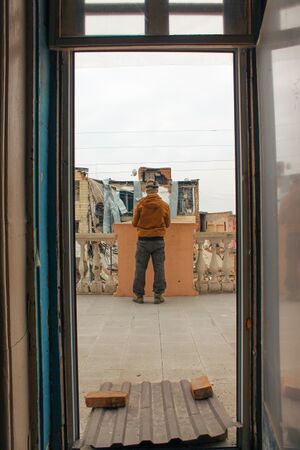The Insulate Ukraine project brings warmth and hope to war-torn Ukraine through the production and installation of temporary windows.
WINDOWS OF HOPE[edit | edit source]

The Tolocar team installed 39 such windows in 5 days in addition to training 3 teams of communal services workers in this remarkably simple but effective technique that transforms lives in the cold winter.
- Glass shards are reported as being the most trauma-inducing consequence of shelling and air raids.
- Insulate Ukraine (IU) windows are triple-glazed polyethene windows designed to protect against the cold.
- IU windows insulate like double glazing, let light through, cost around 10 € per square meter, and can be built at home in 15 minutes from basic materials.
- The concept was developed by Harry Blakiston Houston, a PhD Student from Cambridge university.
- 39 windows were built by the Tolocar project for the most vulnerable dwellers of the identified communities.
- 3 workshops were held for the municipal workers who fix the houses after shellings.
- Municipal workers nicknamed the windows “plivkopaket”: a camera made of polyethylene.
“When we came to Okhtyrka, the most important thing for the people we worked with were not the windows we fixed, but that there was somebody there to listen to them, to hear their stories, and know that we care, even if we were complete strangers. They did not expect us to change anything, some of them did not even need the solution that we had to offer – but we could give them some of our consumables, which would take 10 seconds, and we could give them attention, which would take 15 minutes. And that was what they needed, and that is what I mean when I say that we don’t help Ukraine in an abstract way, but help real Ukrainians.” Denys Kvasov, Tolocar Operator
During winter average temperatures in Ukraine drop to -8 degrees Celsius. The shattering of an estimated 50,000 windows due to shelling leaves homes vulnerable to the elements. When people are freezing, it does not only make them sick, but also undermines their resolve to defend themselves and stay in their homes which are under the constant threat of invasion. Standard replacement windows are expensive, hard to get, and may be shattered again. Easily accessible solutions, such as using hemp or wood for insulation, fall short in several respects: they do not insulate well, do not let light through, or can be difficult to install.
The Insulate Ukraine project, initiated by British researcher and activist Harry Blakiston Houston, set out to come up with an easily accessible solution which addresses these common shortcomings in the winter of 2022/23. The solution is ingenious in its simplicity: triple-glazed polyethene windows.
To build the frame, PVC pipes are cut to size and joined using pipe connectors or duct tape. Then the first air chamber is created by wrapping the frame in polyethylene and fixing it with tape. The insulating noodles are placed around it and the frame with the noodles is wrapped in film once again. Four spaced layers of cellophane create three air chambers which make it a very effective insulator. The windows insulate like double glazing, let light through, cost around 10€ per square meter, can be built at home in 15 minutes from basic materials, and last for several months or years (depending on conditions) without the risk of shattering again from continued shelling.
- PVC piping
- 4 layers of stabilized polyethylene film which doesn’t degrade under sunlight
- Insulating noodle - if this material is not available, it can be replaced with newsprint pages, bubble wrap or any other component that is soft at the edges.
- Duct tape
When Harry reached out to the Tolocar project in October 2022, we were impressed by the simple yet effective design, the collaborative approach of Insulate Ukraine, and the results achieved in their pilot projects in the city of Izium. We then tested the solution, and teamed up with BUR (Building Ukraine Together), the Okhtyrka Youth Centre, the Velyka Pysarivka Village Council, and several municipalities in the Sumy region in Northeastern Ukraine, who all provided us with lists of people who needed windows. Together, the teams were able to install 39 windows across 12 locations in just 5 days. The windows were installed in a variety of buildings, including municipal buildings like the Okhtyrka House of Culture, apartments and private houses in Trostyanets, Okhtyrka and Velyka Pysarivka.
With a solution so simple, cheap and effective - it’s the knowledge transfer through workshops that delivers one of the biggest impacts. After repeated shelling in Velyka Pysaryvka in May of 2023, communal workers replaced all of the broken windows with Insulate Ukraine ones within a couple of days. In doing so, they noted how much safer this solution is compared to permanent glass windows in that they do not shatter. Glass shards are reported as being the most trauma-inducing consequence of shelling and air raids.
It is to these teams that we owe the term “plivkopaket” - a camera made of polyethylene - which is an apt adaptation of the Ukrainian term “steklopaket” to describe a double-glazed window made of plastic film.
This inspiring project is a testament to the power of community-driven initiatives and knowledge exchange: Through workshops and collaboration, it brings warmth and relief to many families in one of the regions most affected by the war. With each window installed, Insulate Ukraine empowers communities to take charge of their living conditions, offering hope and a brighter future in challenging times. We are proud to be their partner!
“By teaching others, we empower Ukrainians to fix the problem themselves. What takes 6 people 100 days takes 60 people only 10 days.” Insulate Izyum project





